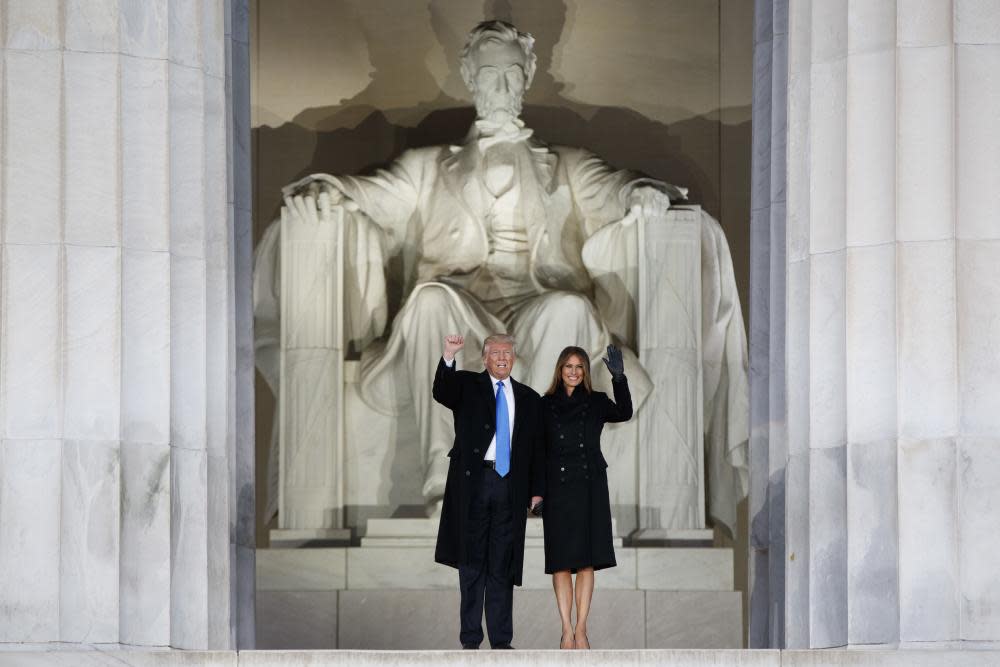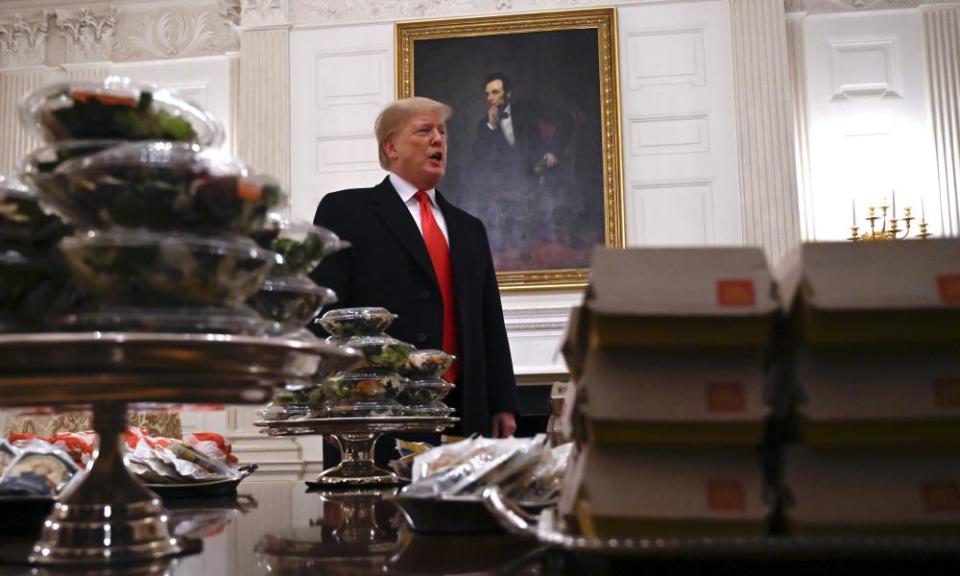How Lincoln's disdain for demagogues pricks Trump's Fourth of July pomposity

Donald Trump is orchestrating his Fourth of July extravaganza to be his most spectacular act of self-flattery, his first appearance on the National Mall since his inauguration but before a certifiably larger crowd and ending with a burst of fireworks.
He has always given careful thought to his staging. His introduction to The Apprentice, driven to the thumping beat of For the Love of Money, showed the master of the universe striding from a limousine at Trump Tower, riding in a Trump helicopter and climbing the ramp of a Trump airplane. Now, however, he will display himself on the steps of the Lincoln Memorial. With the illuminated statue of the 16th president as his backdrop, Trump will highlight the magnitude of his own greatness by standing in reflected glory.
Or maybe Trump thinks it’s the other way around and he, not Lincoln, will be the radiant one.
Since becoming president, Trump’s estimation of Lincoln has declined even as his estimation of himself has inflated. In 2017, Trump was willing to concede that Lincoln was the greatest president, saying: “With the exception of the late, great Abraham Lincoln, I can be more presidential than any president that’s ever held this office.” By the next year, he had eclipsed Lincoln in his mind, proclaiming: “You know, a poll just came out that I am the most popular person in the history of the Republican party. Beating Lincoln. I beat our Honest Abe.” (Of course, there were no polls in the 19th century.) Then, this year, bringing the Boston Red Sox into the Lincoln Bedroom, according to the Red Sox chairman, Tom Werner, Trump “was talking about Abraham Lincoln losing the war, and he said I know you guys lost a game or two but this was a war”.
As Trump’s defense of Confederate monuments since Charlottesville has risen, his opinion of Lincoln has fallen
Lincoln? Loser.
Trump’s most recent reflection on his competition with Lincoln came in his interview with George Stephanopoulos, broadcast on 16 June on ABC News, in which he blurted: “If you can believe it, Abraham Lincoln was treated supposedly very badly, but nobody’s been treated badly like me.” Just two weeks earlier, on 2 June, he had delivered a brief speech written for him at the gala of Ford’s Theatre, praising Lincoln’s “eternal legacy”. Left to his own devices, demoting the “supposedly” tragic event at that theater, Trump rated himself superior as a martyr.
On 4 July, while Trump mugs on the Mall, the marble Lincoln will maintain a dignified silence. Many have wondered what Lincoln might say if confronted by the people and events of their time. In 1914, at the beginning of the first world war, the poet Vachel Lindsay, in Abraham Lincoln Walks at Midnight, portrayed a ghostly Lincoln deploring the conflagration. But we do not have to wonder what Lincoln might say about demagogic exploitation of the Fourth of July or hypocritical displays about the ideals of the Declaration of Independence. His statements on the subject were voluminous, plain and scathing.
Here is a small sample:
To a friend, 15 August 1855:
On the question of liberty, as a principle, we are not what we have been. When we were the political slaves of King George, and wanted to be free, we called the maxim that ‘all men are created equal,’ a self-evident truth; but now when we have grown fat, and have lost all dread of being slaves ourselves, we have become so greedy to be masters that we call the same maxim ‘a self-evident lie.’ The Fourth of July has not quite dwindled away; it is still a great day – for burning fire-crackers!!!
More than the expropriation of Independence Day to justify slavery agitated Lincoln. A week later, on 24 August, he wrote his close friend Joshua Speed to complain about the rising anti-immigrant, nativist and super-patriotic Know Nothing party as a duplicitous mockery of the Declaration of Independence:
As a nation, we began by declaring that ‘all men are created equal.’ We now practically read it ‘all men are created equal, except negroes.’ When the Know-Nothings get control, it will read ‘all men are created equal, except negroes, and foreigners, and Catholics.’ When it comes to this I should prefer emigrating to some country where they make no pretense of loving liberty – to Russia, for instance, where despotism can be taken pure, and without the base alloy of hypocrisy.
During his famous debates with the racist demagogue Stephen A Douglas in 1858, Lincoln ridiculed Douglas’s denial that the Declaration stood for human equality. In notes preparing for those debates, Lincoln spelled out what both supporters of slavery and those calculatingly indifferent to it were doing, which was:
… to subvert, in the public mind, and in practical administration, our old and only standard of free government, that ‘all men are created equal,’ and to substitute for it some different standard. What that substitute is to be is not difficult to perceive. It is to deny the equality of men, and to assert the natural, moral, and religious right of one class to enslave another.”
In February 1861, after his election as president, on his way to Washington, Lincoln spoke at Independence Hall in Philadelphia, and declared:
I have never had a feeling politically that did not spring from the sentiments embodied in the Declaration of Independence … If [the country] can’t be saved upon that principle, it will be truly awful. But, if this country cannot be saved without giving up that principle – I was about to say I would rather be assassinated on this spot than to surrender it.

It should not be surprising that as the emotional intensity of Trump’s defense of Confederate monuments since Charlottesville has risen, his opinion of Lincoln has fallen. The man who boasts he has never read a biography of a president actually shows a rudimentary if warped sense of history. But Lincoln had more than a little to say about the cause of the Confederacy, which was slavery:
I hate it because it deprives our republican example of its just influence in the world – enables the enemies of free institutions, with plausibility, to taunt us as hypocrites – causes the real friends of freedom to doubt our sincerity, and especially because it forces so many really good men amongst ourselves into an open war with the very fundamental principles of civil liberty – criticizing the Declaration of Independence, and insisting that there is no right principle of action but self-interest.
Next year, Trump should simply reserve his Fourth of July festivity to the Trump hotel or the Russian embassy. In such settings he can celebrate himself, as Lincoln said, “without the base alloy of hypocrisy”.
Sidney Blumenthal is the author of All the Powers of Earth 1856-1860, the third of his five-volume biography, The Political Life of Abraham Lincoln, to be published in September by Simon & Schuster

